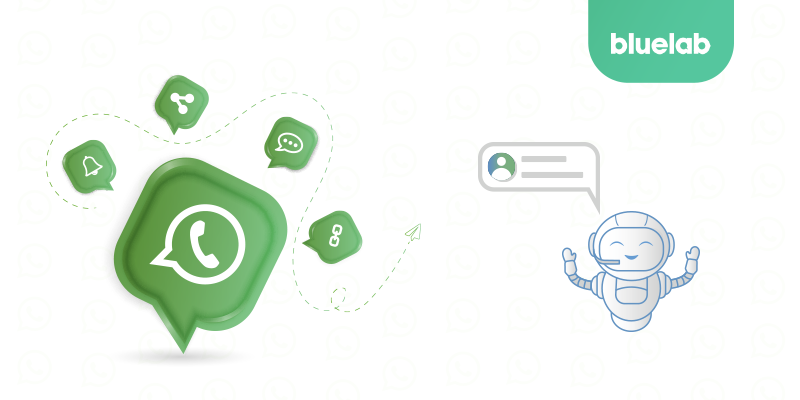According to a study by Infobip, one in four people have already used chatbots for customer service in banking apps, stores, or e-commerce. ...
Read more
Chatbot for WhatsApp: Everything you need to know
29/10/2021
If your company, in 2021, still doesn’t use a WhatsApp chatbot, we can guarantee that it’s missing out on reducing costs and also losing various business opportunities.
This is because WhatsApp is the most widely used instant messaging app in the world, being a unanimous choice among smartphone users.
According to WhatsApp itself, 2 billion people use the app daily. Approximately 100 billion messages are exchanged via the app every day. And in Brazil, 99% of smartphones have the messaging app installed.
With its simple design and intuitive interface, WhatsApp allows users to send and respond to messages quickly, share images, videos, and audios, as well as make audio and video calls.
Until 2018, these features were theoretically available only to users. However, in that year, WhatsApp Business was launched, a version exclusive for businesses.
In addition to WhatsApp Business, the WhatsApp Business API was also created, which, as the name suggests, offers an API for automating conversations between bots and humans.
In this article, you will learn what a WhatsApp chatbot is, why use it, how WhatsApp Business works, examples of use, and how to create your customer service bot within the messenger.
What is a WhatsApp chatbot?
A chatbot is a conversational robot capable of interacting and conversing with humans through text messages, in an automated way.
Through APIs, these customer service robots can be integrated into websites, e-commerce chats, CRMs, and communication platforms like WhatsApp, for example.
Why use it?
Chatbots usually solve simpler issues, forwarding only the more complex or critical cases to human agents, that is, those that need a human touch.
Thus, chatbots free up the time of customer service teams so they can focus on more strategic activities that add more value to the business.
This helps companies reduce costs with personnel, increasing employee productivity as well as customer satisfaction, as customers are able to get their questions answered and resolve issues more quickly.
A WhatsApp chatbot also allows for greater brand reach, helping companies strengthen their digital presence on the app most preferred by consumers and customers.
Not to mention that, with a WhatsApp chatbot, companies can respond to their customers 24 hours a day, 7 days a week, even if it’s just a message like, “We’ll get back to you shortly.”
Before WhatsApp Business, companies were already using the app, but the new version came to professionalize the message exchange between businesses and people.
How does WhatsApp Business work?
For businesses, there are WhatsApp Business and WhatsApp Business API. Although similar, they have particularities that you need to understand to make the best decision for your business.
WhatsApp Business
WhatsApp Business allows you to create a business profile with information such as address, email, website, hours of operation, and more, along with an exclusive authenticity verification badge.
It is also possible to create automatic responses for cases when a customer sends a message outside of business hours, in addition to other pre-defined responses for frequently asked questions.
Additionally, you can tag conversations or contacts with labels for easier organization and also view information on the number of messages sent, delivered, and read.
All these are useful features, if your business doesn’t handle a high volume of customer service and doesn’t require chatbots.
However, if your company receives a large number of messages daily, including questions beyond business hours, open accounts, and other simple issues, the best option is the WhatsApp Business API.
WhatsApp Business API
This version includes all the features of the first mentioned, but with the advantage of allowing API integration with the business’s WhatsApp account.
With the integration of a conversational API, companies can automate more complex conversations.
Thus, the chatbot can be programmed to answer customer inquiries, send documents like billing statements, and perform more complex interactions.
Additionally, with WhatsApp Business API, companies can include human agents in the process when chatbots are unable to resolve the customer’s issue.
What are the best practices?
WhatsApp does not allow businesses to use chatbots for direct sales. Instead, the company encourages businesses to use this resource for customer interactions.
Post-sale: you can answer questions about products and/or services sold, send tips, and also provide updates on order status, situation, delivery estimate, and conduct satisfaction surveys.
Lead qualification: you can also create a conversational flow to identify your customers’ desires and needs, as well as offer products and/or services that may be relevant to them.
Guidance and instructions: show yourself available to guide and instruct your customers on how to make the best use of your solutions, with tips and usage examples from other customers, for example.
Content promotion: educate your customer and keep them informed about your business’s objectives and differentiators to always align expectations.
How to create your WhatsApp chatbot?
For small businesses, WhatsApp Business is a viable option that meets moderate service demand. Now, for medium and large businesses, WhatsApp Business API is the best alternative.
If you fit the latter case, the ideal is to seek a specialized company that simplifies the integration of your API with WhatsApp Business.
That’s because these providers can obtain your approval and implement your chatbot more quickly.
Thus, you won’t need to worry about the bureaucratic part related to documentation and the technical aspect, which will be fully managed by the supplier.
Thank you for reading. See you next time!
Also read: Learn everything about First Call Resolution (FCR)